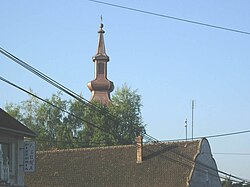Grebenac
Grebenac | |
|---|---|
 The Romanian Orthodox Church | |
| Coordinates: 44°52′21″N 21°15′11″E / 44.87250°N 21.25306°E | |
| Country | |
| Province | |
| District | South Banat |
| Municipality | |
| Elevation | 60 m (200 ft) |
| Population (2002) | |
• Grebenac | 1,017 |
| Time zone | UTC+1 (CET) |
| • Summer (DST) | UTC+2 (CEST) |
| Postal code | 26347 |
| Area code | +381(0)13 |
| Car plates | VŠ |
Grebenac (Serbian Cyrillic: Гребенац, Romanian: Grebenaț) is a village in Vojvodina, Serbia. It is situated in the Bela Crkva municipality, in the South Banat District, Vojvodina province. The village has a Romanian ethnic majority (82.3%) and a population of 1,017 (2002 census).
It was the site of an ancient Roman fort.
Name
In Serbian, the village is known as Grebenac (Гребенац), in Romanian as Grebenaț, in Hungarian as Gerebenc, and in German as Grebenatz.
Historical population
Romanian presence is attested by a stone cross in the local graveyard, from 1297 and by a document in Wiena about a trial between Luca family and another local family. In 1970s some 490 residents of Grebenac went abroad as gastarbeiters, mostly to Salzburg where there was some 300 of them.[1]
- 1961: 2,129
- 1971: 2,040
- 1981: 1,893
- 1991: 1,608
Personalities
- Vasko Popa, poet; studies at the University of Bucharest and in Vienna. During World War II, he fought as a partisan and was imprisoned in a German concentration camp.
See also
References
- ^ William Zimmerman (1987). Open Borders, Nonalignment, and the Political Evolution of Yugoslavia. Princeton University Press. p. 97. ISBN 0-691-07730-4.
- Slobodan Ćurčić, Broj stanovnika Vojvodine, Novi Sad, 1996.



